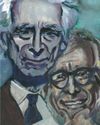
As well as several striking novels, notably The Unbearable Lightness of Being (1984), the Czech-French author Milan Kundera (1929-2023) wrote extensively about the role of literature in philosophy. He saw fiction as a perfect vehicle for certain types of philosophy, particularly postmodernism and existentialism. “For me”, he said, “the founder of the Modern Era is not only Descartes but also Cervantes.”
Kundera was born in Czechoslovakia, and died in Paris last July, aged 94. He was heavily influenced by his background, especially by the Prague Spring of 1968, when the Czech government revolted against Soviet rule. The Soviets sent the tanks in to crush the rebellion. That year Kundera’s books were banned in his own country and removed from public libraries. He was befriended by the French publisher Claude Gallimard, but he stuck it out in Czechoslovakia until 1975, when Gallimard finally persuaded him to move to Paris. By that time he had also been sacked from his Czech teaching position and forbidden to work.
この記事は Philosophy Now の April / May 2024 版に掲載されています。
7 日間の Magzter GOLD 無料トライアルを開始して、何千もの厳選されたプレミアム ストーリー、9,000 以上の雑誌や新聞にアクセスしてください。
すでに購読者です ? サインイン
この記事は Philosophy Now の April / May 2024 版に掲載されています。
7 日間の Magzter GOLD 無料トライアルを開始して、何千もの厳選されたプレミアム ストーリー、9,000 以上の雑誌や新聞にアクセスしてください。
すでに購読者です? サインイン

FALLING DOWN
Thomas R. Morgan considers how personal identity is maintained, and how it is lost.

Pythagoras (570-495 BCE)
Daniel Toré looks beyond the mathematician to the philosopher.

Wordsworth & Darwin
Christine Avery wonders whether poetry can help us to deal with science.

Plants & Philosophy
Caroline Deforche sees similarities between gardening and philosophising.

Dr.Gindi sculptor, has a philosophical conversation with Richard Baron about sensation, life, infinity and, you guessed it, sculpture.
Dr. Gindi is one of Switzerland's foremost sculptors, whose work has been exhibited in many countries.

Thomas Aquinas on Extraterrestrial Life
Babatunde Onabajo tells us why Aquinas did not believe in aliens.

The Fire This Time
Tim Madigan on Ray Bradbury, Bertrand Russell and Fahrenheit 451.

Trust, Truth & Political Conversations
Adrian Brockless wants a recognition of human value in political debate.

Philosophy & The Crown
Vincent Di Norcia on monarchy and stability.

Technologists & Ethicists
Stephen L. Anderson laments inadequate moral insight among tech leaders.